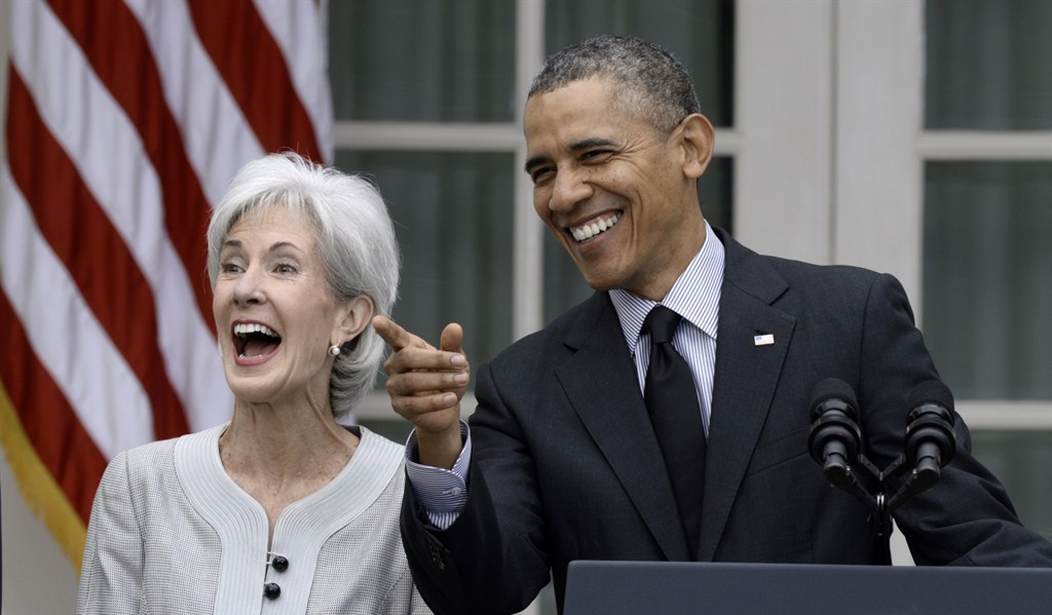Last week, we analyzed the major news that Blue Cross/Blue Shield (BCBS), a health insurance titan, is withdrawing from Minnesota's individual market due to Obamacare-caused financial losses. We wondered if this move might be a sign of things to come, as we saw with United Health's tiered departure from most Obamacare exchanges. Via the ever-watchful John Sexton, it's beginning to look like BCBS will face powerful market incentives to sever ties with Obamacare, particularly if their 2017 steep rate hike increase requests are rebuffed by government regulators. Investors Business Daily reports:
Across the country Blue Cross affiliates are losing staggering amounts of money thanks to the law, and are putting in for premium hikes that would have been unimaginable before ObamaCare. For example, Health Care Services Corp. -- which owns Blue Cross affiliates in Illinois, Montana, New Mexico, Oklahoma and Texas -- lost $1.5 billion on its ObamaCare-compliant plans last year. As a result, it's requesting a nearly 60% rate hike in Texas, and almost 50% in Oklahoma. HCSC pulled out of the New Mexico exchange last year after the state turned down its 50%-plus rate increase. Blue Cross Blue Shield of Tennessee, meanwhile, lost about $300 million in ObamaCare's first two years and is likely to lose another $100 million this year. It wants a 62% increase in premiums, on top of the 36% it got last year. Highmark Group, which owns Blue Cross affiliates in Pennsylvania, Delaware and West Virginia, lost $266 million in just the first nine months of 2015. Blue Cross Blue Shield of North Carolina lost $280 million on ObamaCare in 2015. Earlier this year, CEO Brad Wilson talked about possibly pulling out of ObamaCare, saying that "we can't offer something for sale in this marketplace that we know every time it's purchased we're losing money." Arizona'S Blue Cross wants a 65% rate hike after reporting $185 million in losses in ObamaCare's first two years. In Alabama, Blue Cross figures it lost $135 million last year, and $64 million in Nebraska.
Recommended
Blue Cross produced a landmark study demonstrating that new enrollees through Obamacare's exchanges cost 22 percent more to cover than consumers in the employer-based market. Why? The new marketplaces' risk pool demographics have been older and sicker than projected. Not enough young and healthy Americans -- whose premiums were supposed to subsidize others' care -- have purchased coverage through the program, largely because they cannot afford the "Affordable" Care Act's monthly rates and high out-of-pocket costs. And when lopsided risk pools fuel deep losses, insurers are faced with three choices: (1) Absorb the losses, which would be unsustainable and fiscally irresponsible, (2) raise rates significantly (as many are attempting), which will only drive away more younger and healthier consumers, or (3) flee the marketplaces, leaving Obamacare "beneficiaries" with even fewer options for coverage and care. The market's "stabilization" process isn't going very well, which helps account for why the failing law remains unpopular with the American people. Republicans unveiled a detailed alternative to Obamacare last week, an important and positive step. In case you missed it, here's a discussion about it, featuring Speaker Paul Ryan and several relevant committee chairmen:
Philip Klein notes that despite all the talk about this long-awaited "unified" plan, dissension in the ranks remains, with potential policy battles ahead. Finalized premium increases for next year will be announced to customers just days before the November election. Hillary Clinton first proposed the framework for Obamacare, including its widely-detested individual mandate tax. She says the law is working.

























Join the conversation as a VIP Member